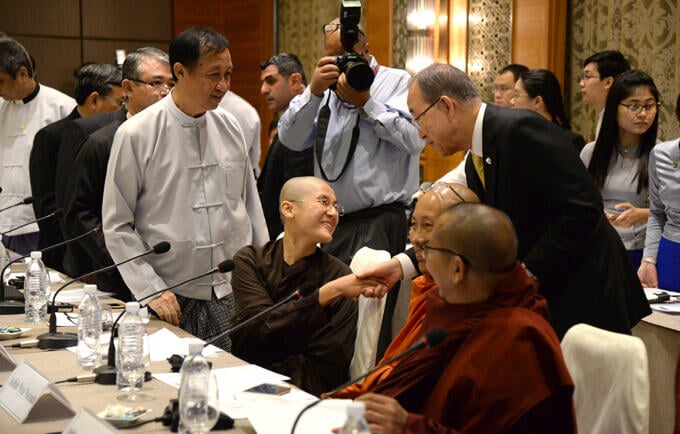Before addressing a large audience at the 21st-century Panglong Conference in Myanmar’s capital Nay Pyi Taw on 31 August, UN Secretary-General Ban Ki-moon met separately with the country’s religious leaders.
“I count on your leadership to show the way towards solidarity and unity in Myanmar”, the Secretary-General told the representatives of Buddhism, Christianity, Islam, Hinduism, Judaism, Bahá'í and interfaith networks. “I share with you a belief in the greater good of humankind, regardless of religious affiliation.”
Supported by UNFPA, and hosted by the Ministry of Foreign Affairs, the meeting aimed to promote the inclusion of both majority and minority religious groups in Myanmar’s peace and development processes. The meeting builds on Government and UNFPA consultations with faith leaders prior to the release of census data on religion earlier this year.
“Around the table were faith leaders who have already demonstrated their ability to step out and step up to the challenge, making their voices heard in the quest for pride, tolerance and peace within the context of religious diversity”, said Janet E. Jackson, UNFPA Representative for Myanmar.
“We must be not only peace lovers, but also peace makers”
The faith leaders used the opportunity to speak directly with the UN Secretary-General to express their commitment to peaceful co-existence, but also to raise concerns.
“Brothers and sisters from all faiths who have come together today, please spread the true essence of your own religion, especially to young people”, said the Buddhist monk Sitagu Sayadaw. While the majority of people in Myanmar are Buddhists, Sitagu Sayadaw called for the national curriculum to include education on all religions as a way to promote mutual understanding between people.
Daw Kay Tu Mar Lar, representing over 60,000 Buddhist nuns in Myanmar said: “We must be not only peace lovers, but also peace makers.”
Speaking on behalf of Myanmar Christians, Archbishop Stephen Than Myint Oo requested official government representation for Christians. He also expressed the need to move forward from the past: “Now is the time to accept our oneness, and to unite in hope.”
Pleads for change and for human rights
Muslim faith leader U Kyaw Nyein delivered a compelling statement in support of human rights. He said that many Myanmar Muslims feel persecuted, and said: “We must end the abuse of religion for political purposes and as the basis for intimidation, discrimination and hatred.”
Hindu leader Dr. Hla Tun also sent a strong message pleading for change and for the rights of all people to be upheld, regardless of religion and ethnicity.
Representative of the Jewish community U Sammy Samuels stressed the importance of promoting religious tolerance among young people, saying: “We can all live peacefully side by side in this beautiful country.”
Bahá'í faith leader U Tin Kyine also spoke of the younger generation: “Today when we are sitting under the same roof working for peace, the sun of peace is shining on everybody. But most important among us are our children. We must teach them loving kindness for a better world.”
“I count on your leadership for a better future”
The Secretary-General thanked all participants for their expressions of harmony, tolerance, compassion and mutual respect, and also listened to the profound concerns of their communities. He discussed the importance of the rule of law, human rights and human dignity, emphasizing the need for strong institutions, and for curbing hate speech. He also focused on the need for equitable distribution, including access to health and education services and livelihoods. He called on everyone around the table to work together so that Myanmar’s development will benefit all communities, saying:
“The whole world is looking to Myanmar at this critical time in your country’s history. Faith leaders have an important role to play. I count on your leadership to ensure that no one is left behind as Myanmar strives towards a better future.”


